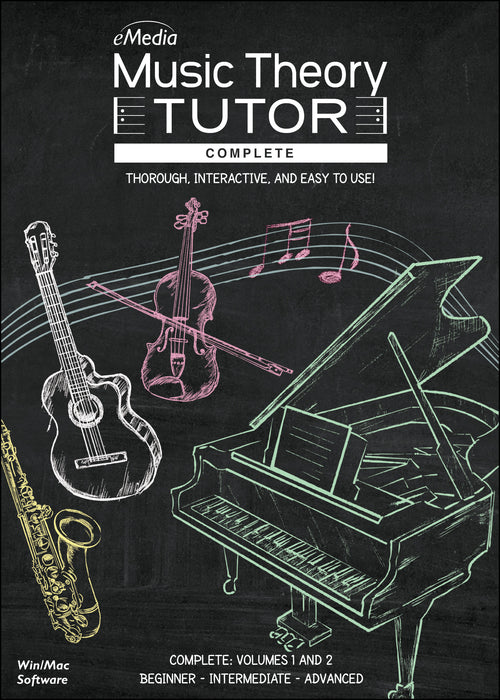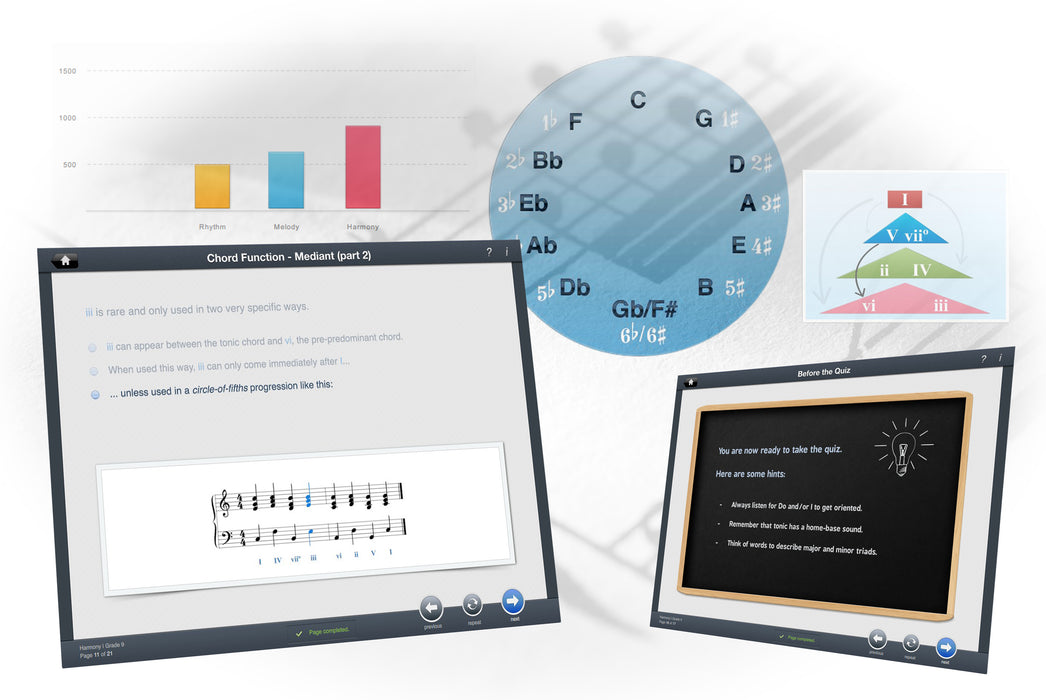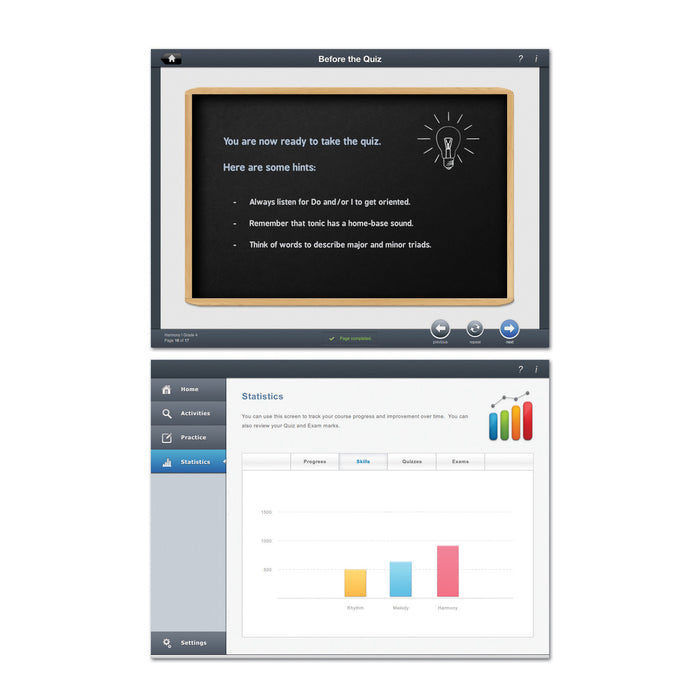
Adium Music Theory Tutor Cmp
Includes both volumes 1 and 2 of the Music Theory Tutor programs in a value priced bundle!
eMedia Music Theory Tutor Complete takes you all the way from learning the basics of music theory to a deeper understanding that will help you to compose better, improvise easier, and learn music by ear more effectively. Over 430 engaging lessons teach the crucial musical elements of rhythm, melody, and harmony. Learning is easier and more effective with images, audio, interactivity, and numerous examples. The Intelligent Practice feature analyzes your responses to questions and skill level to create an individualized practice program to improve your weak areas, just as an instructor would.
Many lessons let you enter pitches simply by humming, singing, or playing your instrument into the computer’s microphone. The software listens as you tap in rhythms, sing back pitches to guess intervals, and interact with the lessons. Music Theory Tutor Complete will show you when you match pitches correctly in a lesson, and shows a chart of your progress as you move through the course. Gain confidence as you pass quizzes at the end of each subject and ace tests at the end of every grade level completion.
In eMedia Music Theory Tutor Complete, you’ll learn all about the building blocks of music. The structured course and practice exercises help you hear musical keys, scales, intervals, chords, and rhythms “in your head” to help you compose without an instrument, improvise solos, and learn songs by ear faster.
"Well-thought-out music training application." - Softpedia
"This is a very, very cool tool for music teachers or any Mac user who wants to improve their singing or understanding of music."
- Mac360
"Offers a thoughtful, step-by-step introduction to ear training."
- Dr. Erik Steighner, saxophonist and music teacher
LEARN HOW MUSIC WORKS -
Learn how rhythms, scales, chords, and chord progressions are created. Understand how tempos are described and notes are subdivided and grouped into measures. Learn the function of melody and harmony and how to use harmonic and rhythmic cadence. Understand all of the fundamentals that every composer, songwriter, and instrumentalist should know.
TRAIN YOUR EARS - SEE THE MUSIC AND HEAR IT “INSIDE YOUR HEAD” -
Sight-sing music as you read it and hear it “in your head” by recognizing rhythms, intervals, and chord relationships. Start composing away from your instrument and sight-read faster!
TAP, HUM, SING and PLAY -
Answer questions the natural way. Tap out the answer to a rhythm question; hum two notes to identify an interval, sing the notes in a melody, or play them on your instrument. Learning music shouldn’t be about typing!
GET HELP AS YOU GO AND SEE YOUR PROGRESS -
Take tests and view statistics to track your progress and watch yourself improve. The Intelligent Practice feature tracks your responses in lessons and automatically selects questions to improve weak spots as an instructor would.
Features:
- A step-by-step curriculum designed by Dr. Gregory Simon, who holds a doctorate in composition from the University of Michigan and teaches at the University of Colorado.
- Over 430 lessons, exercises, and tests with graphics, interactivity, and sound.
- Both music theory and basic ear training combined into one powerful application.
- A graph showing testing and answer statistics to let you easily measure your progress.
- Intelligent Practice that tracks your progress and automatically selects questions to improve weak spots.
- Exercises teaching rhythmic fundamentals including tempo, counting beats, measures, values for notes and rests, and syncopation.
- Rhythmic lessons teach counting plus recognition of simple and compound time signatures (including 3/4, 4/4, 5/4, 6/4, 7/4, 3/8, 9/8, etc.) and cut time.
- Interactive lessons for learning to read music with explanations and exercises for learning clefs, key signatures, note pitches, names, and rhythmic values (including dotted and beamed notes) including advanced triplets.
- Explanation of major, minor (harmonic and natural), and chromatic scale construction plus modes and the Circle of Fifths.
- Ear training and theory exercises teach you to identify and understand note direction and motion, intervals (fourths, fifths, tritones, melodic/harmonic, etc.) scales, chords, and progressions.
- Melodic identification studies that cover note stability and resolution plus the roles of melody and harmony.
- Interval identification studies (fourths, fifths, tritones, melodic/harmonic, etc.).
- Chord theory lessons outline chord construction (major and minor triads, diminished, augmented, and 7ths), inversions, and arpeggios.
- Lessons on creating chord progressions covering chord positions and functions within progressions (tonic, dominant, subdominant, etc.), Roman numeral (I, IV, V, etc.) and figured bass notation, plus chord substitutions, phrasing, cadence, passing, and pedal tones.
- Lessons and exercises in musical form and analysis (binary, ternary, rondo, phrasing, etc.) help you better understand composition.
- A harmonic flowchart plus major and minor harmony studies.
- Solfege studies with arpeggio and sight singing.
Requirements:
- mac
- cpu:2.2GHz CPU
- ram:2
- disk:0
- version:10.6 or later
- internet_required:1
Videos:



